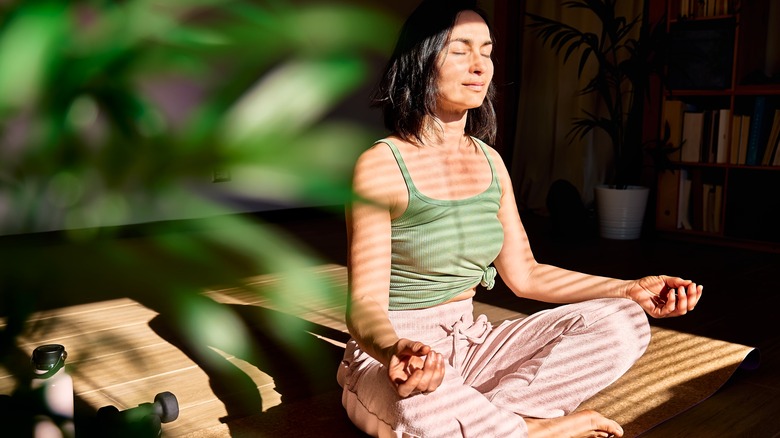How Self-Care Can Change Your Relationship For The Better
When it comes to romantic relationships, we're conditioned to believe that our partner's needs should always come before our own. From the books you read to the movie you watch, the concept of martyrdom is often romanticized, further drilling into our heads the idea that one must suffer to make their partner happy. But this shouldn't be the case. In order to foster a healthy romantic relationship with someone else, you should first learn how to practice self-love, which naturally requires a consistent self-care practice.
Look at your targeted ads on Instagram, and you'll find that you're bombarded with products that aim to help you practice self-care, from beauty and wellness products to experiences that promise to make you feel good. But self-care doesn't begin and end with occasional trips to the spa or meditating every day. Self-care means consistently investing time and energy in doing things that deliver fulfillment, so you'll have the emotional resources to give to the people you love.
As Dr. Dana McNeil, founder of The Relationship Place clarified to InStyle that "self-care is not a luxury or an indulgence, because if you don't have any gas in the emotional tank left you are not going to be able to show up and give back." She added, "You can't physically, emotionally, or mentally give to others if you are wiped out." When you're happy with yourself and your needs are fulfilled, you'll be more capable of connecting with others and maintaining your relationships with them, too.
Self-care helps you set healthy boundaries
When you love someone, you often want to spend every waking time you have with them. You tend to hyper-fixate on your partner and attend to their every need, but it's important to know that doing so is dangerous as it can lead to codependency. According to Dr. Mark Mayfield, a licensed professional counselor, codependency typically stems from a "poor concept of self and poor boundaries, including an inability to have an opinion or say no," via Verywell Mind.
Codependency typically creates an unhealthy relationship dynamic, with one party experiencing burnout due to constantly fulfilling the needs of the other. This is where self-care comes in, as it helps you to set boundaries between yourself and your partner. Not to be misconstrued as putting up walls between the two of you, creating boundaries in a relationship to prioritize your well-being is vital.
"Stating our boundaries is about showing respect to ourselves and our own needs," Dr. Suzanne Degges-White, a licensed counselor and the chair of the Department of Counseling and Higher Education at Northern Illinois University, told Women's Health. She continued, "Our first and most important relationship is with our own selves. If we do not tend to this relationship, we are not going to be able to manage optimal relationships with others."
Self-care also helps you pursue your passions
There's no overstating just how much pursuing your passions helps you feel more alive. And in romantic relationships, it's important to remain in touch with your interests and passions so as not to lose sight of who you are, even if it's not aligned with your partner's interests. Productivity expert Laura Vanderkam confirmed to The New York Times that carving out time for the things you're passionate about contributes greatly to your happiness.
"Life just feels better when you have things in your hours that you want to do," she noted. "There's moments where time almost has no meaning because we're so happy about what we're doing. The more time you can spend in that zone, the better life feels." If you're adamant about involving your partner, you may want to try introducing them to the things you love doing and making it a bonding opportunity between the two of you.
Additionally, if you somehow can't manage to find the time to enjoy your hobbies, Vanderkam advises you should "turn your passion into an obligation," like signing up for a class or hiring an instructor to help you improve your skills. "If you've paid for it, you're more likely to show up," she pointed out.
Self-care can make you more in tune with yourself
Self-care allows you to know yourself better beyond the confinements of your relationship. Sure, it's crucial to know your partner on a deeper level, but knowing yourself is just as important. And at the core of self-care is cultivating a "self-relationship." Kate O'Brien, a New-York based licensed therapist, defines it as a relationship that "encompasses your feelings about yourself, the way you treat yourself, and the decisions you make for yourself," via Psych Central. She noted that everyone should always be "thoughtful toward your self-relationship because it affects all other aspects of your life."
Forging a deeper connection to yourself may be vague a concept, but it's not as hard as it sounds. Even as simple as doing things on your own allows you to learn more about your needs and wants. It's easy to get caught up with attending to your significant other's needs that you tend to neglect your own. When you are deliberate with your self-care time, you'll get the chance to connect with yourself and have a better understanding of what makes you feel fulfilled.
There's really no specific way of making your "self-relationship" thrive, but registered clinical counselor Elspeth Robertson, says that it's all about doing things that make you happy. "Take yourself out on a date/playdate," she said. "Block out time and allow yourself to lean into curiosity and joy, just like you would on a date with a partner or a gathering with friends."
Self-care has positive health outcomes
Self-care is a multi-billion dollar industry, per the Los Angeles Times. Health experts always share the benefits of taking care of yourself not just physically, but mentally and emotionally. Dr. Kaylee Crockett, a clinical psychologist in the UAB Department of Family and Community Medicine, highlighted that self-care should be prioritized "because it enhances our well-being by keeping us connected to ourselves and what matters most to us," as well as helps "prevent illnesses from occurring or recurring, and it builds our capacity to handle stress and recover from adversity, via UAB News.
Exercising and eating clean is a no-brainer, but doing more self-care like reading a book, going on walks, having a night out with your girlfriends, or even as simple as sleeping in for a few more hours can already contribute greatly to your mental well-being. It's also worth considering that sometimes, self-care comes in the form of not doing anything. It's learning how to say no to the people around you in an effort not to overexert yourself. You don't have to make yourself accessible to everyone 24/7. At times, learning how to say no and prioritizing your me-time is key to avoiding burnout.
When you do put yourself first, the less stressed you will be. You're less likely to experience anxiety, and susceptibility to incurring diseases and stress-associated health concerns, per the National Institute of Mental Health. In short — self-care does wonders in making you healthier.
Self-care can help strengthen your relationship
The old adage that if you can't love yourself, it's impossible to love anybody else, may seem cliché at this point, but it's a popular statement because it rings true. Some people conflate prioritizing self-care and self-love with selfishness, but it's actually the complete opposite. "Self-love isn't navel-gazing and never contributing to the world. It's actually the best foundation to have a loving, healthy partnership with someone else," Dr. Adia Gooden, a licensed clinical psychologist, explained to SELF Magazine.
She added, "It's the best foundation to be a parent. It's the best foundation to share your gifts as you work in the world." It's worth noting that there can never be a "we" without the "me" either. As Thriveworks warns, avoiding self-care practices when you're in a relationship only puts the onus on your partner to be the only one responsible for making you feel happy and validated, which will only cause further problems down the line.
While there's nothing wrong with seeking happiness from other people, learning how to do it on your own is the key to a healthy relationship. Creating space and time for you allows you to connect with your values, which will help you to be a stronger and more receptive partner in the long run too.





